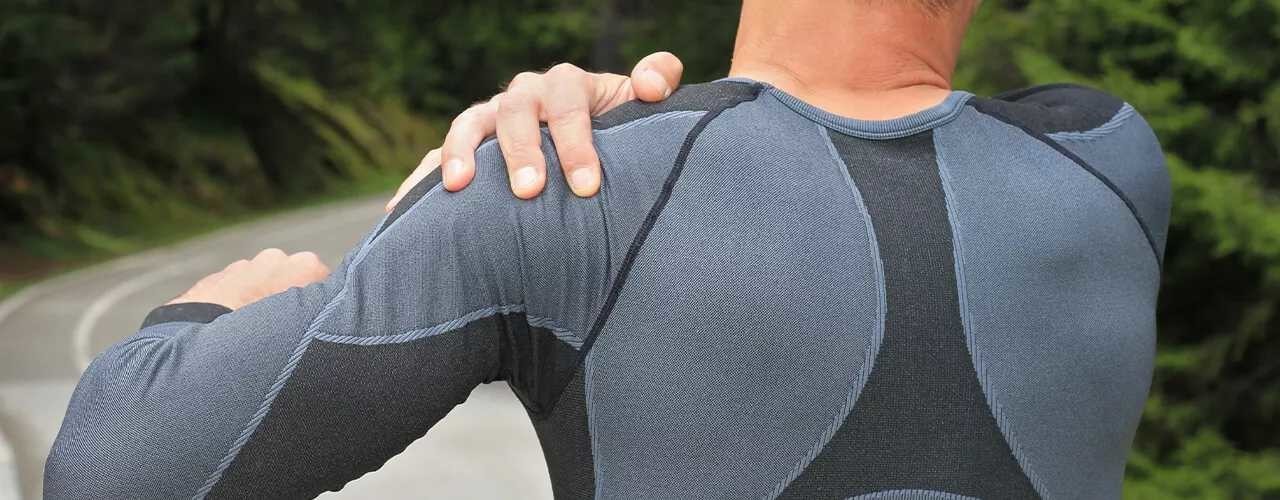
Many of us have felt shoulder pain before. It can feel like a dull ache when you sleep on it or turn over in bed, or when you reach for something on the highest shelf in your kitchen. It can show up after surgery or as the result of an injury. No matter what form it takes, shoulder pain can literally make you feel as if you can’t use your shoulder! There are many reasons why you might be experiencing shoulder pain! Regardless of what your specific condition entails, Amped Physiotherapy is dedicated to offering you pain management and rehabilitation with manual therapy, movement, and exercise.
If you sustain an injury or are in some sort of accident and something goes haywire with the complex coordination than normal shoulders count on, it’s a no-brainer that pain can be the ultimate result! Our physiotherapists can help relieve your pain and get you back to doing the things you love.
Acute tendonitis may happen if the shoulder joint gets overused in a way that you don’t typically use it, another case of too much, too soon. This can be from throwing a baseball too much at the beginning of a season, raking your lawn for hours in the spring, or painting your whole house in 2 days after not having exercised your shoulders in a long time. Poor postural awareness can also be a cause of tendonitis, because it changes the normal forces on the tendons, and can set you up for tendon injury. This particular condition causes the tendons to experience persistent inflammation, resulting in swelling and painful impingement when raising your arm.
The rotator cuff is made up of tendons, muscles, and soft tissue that surrounds the shoulder joint. Rotator cuffs are meant to properly guide, balance, and stabilize the movement of the shoulder joint. However, with untreated tendonitis, acute overuse, high impact injury, poor posture, and age, the rotator cuff can become partially or completely torn.
Thankfully, physiotherapy treatments are often successful with reducing pain and restoring balance and strength to the rotator cuff and scapular muscles to make up for for a partial tear. Some people with large full rotator cuff tears may need surgery, depending on their situation. However, if surgery is necessary, physiotherapy is still an important part of the rehabilitation process and having a full recovery!
Impingement may happen because of unbalanced movement and poor tracking of the humeral head as you lift your arm up in the air. Pain typically occurs when lifting your arm at or above 90 degrees.
This is a condition also known as “adhesive capsulitis.” Frozen shoulder can happen if your arm has been in a sling or cast for a while, if you have had long-standing tendonitis, or if you have been sick in bed and unable to move freely for a long time. Frozen shoulder results in the painful loss of motion as well as the tightening of the shoulder joint that can be severely limiting to your physical activity.
Arthritis is a very common condition affecting people of all ages. The two main forms of arthritis are rheumatoid and osteoarthritis. Rheumatoid arthritis occurs when the immune system begins to attack the membranes surrounding the shoulder joint, resulting in pain and swelling. Osteoarthritis happens when the cartilage in the shoulder joint experiences excessive “wear and tear,” typically due to age or overuse. Both of these conditions result in weakness to the shoulder muscles, difficulty performing normal, daily tasks, and painful loss of motion.
If you’re struggling with shoulder pain, know that physiotherapy is a natural, easy, and comfortable way to find shoulder pain relief, without the need for potentially harmful drugs or invasive surgery. The physiotherapists at Amped Physiotherapy have treated tons of underlying conditions that show themselves as shoulder pain. It’s very common in our clinic for patients to find improvement and relief after just a few appointments!
Here at Amped Physiotherapy our physiotherapists are experts in movement and know how to find the root cause of your pain through various diagnostic tests and techniques. During your initial consultation, your therapist will take a look at your range of motion, coordination, strength, medical history, and joint mobility. Once your therapist forms their diagnosis, he or she can create a special combination of physiotherapy methods that will reduce or relieve you of your issues!
Techniques may include manual therapy to help restore normal joint movement, promote blood circulation and ease soft tissue limitations. Some exercises work to restore strength and the optimal coordination of muscle activation around the shoulder joint. Your therapist will also educate you about exercises you can do at home to enhance your strength and to prevent recurrence of future shoulder problems!

(613) 822-9922

Monday - Thursday: 7:00am - 8:00pm
Friday: 7:00am - 6:00pm